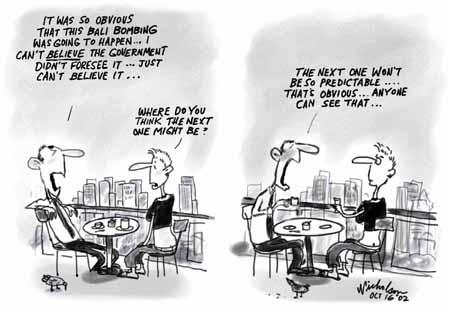Cognitive Biases and Blindspots
Know of a resource missing from this page?
Let
us know...
Weird... this whole area is very important for critical thinking, but I'm having a very hard time finding quality online resources. If anyone knows of any, please let me know.
Influence at Work
Robert Cialdini wrote a "must-read" book on the psychology of persuasion, Influence: The Science of Persuasion. This website is devoted to expounding, promoting, and selling the Cialdini perspective. Contains a lot of useful material. Psychology of Intelligence Analysis, by Richard Heuer, Center for the Study of Intelligence, Central Intelligence Agency
A useful guide to critical thinking in the light of insights from cognitive psychology about how human thinking goes wrong. Despite the title, the book has little essential connection to intelligence analysis; it is really just about thinking in general.
ChangingMinds.org
Lots of notes on persuasion. Make even a short visit and you're unlikely to come
away empty-handed. [11 Oct 04]
Mind Hacks
Blog associated with the book, "a
collection of probes into the moment-by-moment workings of our brain with a view
to understanding ourselves a little better and learning a little more, in a very
real sense, about what makes us tick." Knowing more about how our brains work
will helps us better critical thinkers. [18 July 05] Essays
It's Not
About the Money by Michael McCann
Article on how professional athletes choose employment contracts. Provides
a useful overview of the field of "cognitive biases and heuristics". [20 Nov 05] The Futile Pursuit of Happiness by Jon Gertner
"If Daniel Gilbert is right, then you are wrong. That is to say, if Daniel Gilbert is right, then you are wrong to believe that a new car will make you as happy as you imagine. ...That's because when it comes to predicting exactly how you will feel in the future, you are most likely wrong." Excellent discussion of systematic biases in "affective prediction". [8 Sep 03] Connecting the Dots: The paradoxes of intelligence reform by Malcolm Gladwell
Essay on the intelligence so-called failures leading to 9/11. Two themes stand out: hindsight bias, whereby something which we know to have happened looks much more easily predictable in retrospect than it did prior to the event; and the conflict between the need for competition on one hand and sharing on the other between intelligence agencies. Not Gladwell's finest moment - in my opinion Gladwell is rather too forgiving of the intelligence bureaucracies - but interesting nevertheless. [5 Mar 03]
Mind Games: Psychological Warfare Between Therapists and Scientists By Carol Tavris
Powerful critique of the psychotherapeutic "profession," arguing that therapists' scientific illiteracy can make them positively dangerous. At the heart of their incompetence is the failure to appreciate the cognitive bias known as confirmation bias, and to understand those relatively rudimentary aspects of the scientific method designed to overcome it. [3 Mar 03] The Odds of That by Lisa Belkin
What are the odds of that? Well, actually, considerably higher than you think... A fascinating essay describing our cognitive biases in thinking about coincidences, and relating those topics to terrorism and conspiracy theories. "Most often, though, coincidence is a sort of Rorschach test. We look into it and find what we already believe." [10 Aug 02]
Predictable Irrationality by Steven Pearlstein, Washington Post
Quite a good newspaper article introducing research into our "predictable irrationality" in economic decisions. "Okay, so we're a bit crazy when it comes to money. But once we are confronted with these facts, surely we'll learn our lesson and become more rational in our economic behavior, right? Alas, the early evidence is that we won't..."
Unskilled and Unaware of It
by Dunning and Kreuger
"People tend to hold overly favorable views of their abilities in many social and intellectual domains. The authors suggest that this overestimation occurs, in part, because people who are unskilled in these domains suffer a dual burden: Not only do these people reach erroneous conclusions and make unfortunate choices, but their incompetence robs them of the metacognitive ability to realize it. Across 4 studies, the authors found that participants scoring in the bottom quartile on tests of humor, grammar, and logic grossly overestimated their test performance and ability." Persuasion from The Economist
"Scientists are uncovering ways of making messages more persuasive. Politicians and salesmen use such tricks already. Who can afford not to read on?" [2 May 02] We've Got More Risk Than Our Brains Can Handle by Henry Petroski
Nice essay, describing how our reactions to risk are, unavoidably, governed by emotions, qualitative interpretations, and politics. Finishes by urging that "our elected leaders and decision makers are well prepared to deal with those components of risk assessment." Unfortunately, he provides no practical advice for making that happen. [29 Jun 02] Experts Strive to Put Diseases in Proper Perspective by Gina Kolata
Interesting discussion of how we perceive health risks and how these perceptions are related to the way the information is presented. Discusses new "risk charts" which appear to present risks in more meaningful ways. See also the work on which this article was based, Risk Charts: Putting Cancer in Context (pdf file). [7 July 02] Hostages to Fortune by David Newnham
Interesting, entertaining essay on why we are superstitious and the survival of superstitions in an age of science. "Ask a psychologist, a sociologist or an anthropologist what makes us superstitious... and they will tell you the same thing. When people feel that they have no control over events, they will suspend their belief in the rational and step into a world where the rules seem more flexible." On the down side, the essay does ramble, is disjointed and confuses the topic of cold reading with that of superstition as a response to anxiety founded upon our inherent weaknesses in identifying correlations and causal connections. [29 Dec 02] Hindsight bias: 
Nicholson of "The Australian" newspaper: www.nicholsoncartoons.com.au
Last updated:
19 Jun 2007 |